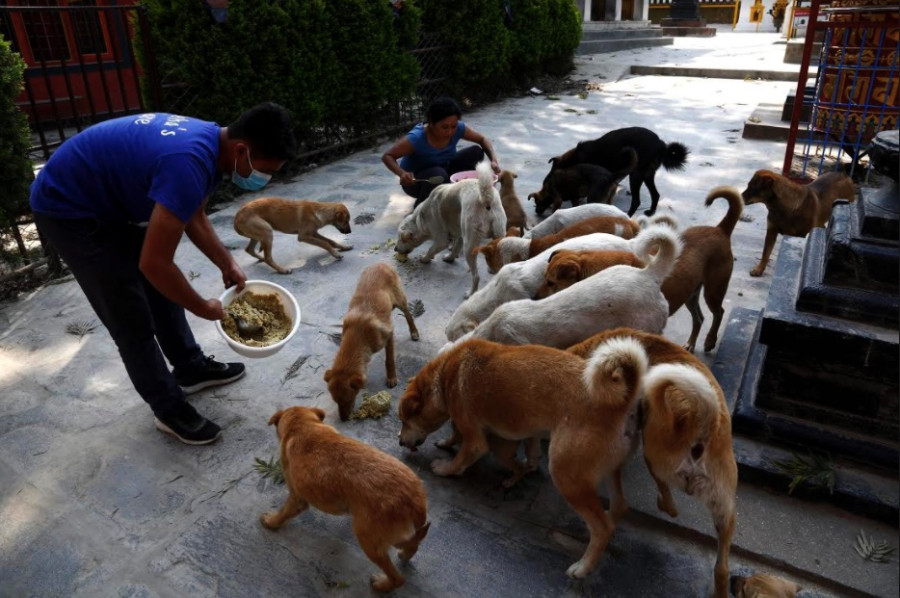Culture & Lifestyle
Not everyone is happy with people feeding stray dogs
Some locals say the food left out for dogs is attracting more strays, inviting nuisance; while others fear dogs could transmit Covid-19—a claim that has no scientific evidence yet.
Tsering Ngodup Lama
For the past six months, Pramila Rai has been feeding nearly a dozen stray dogs in her neighbourhood in Swayambhu, Kathmandu. And when the government announced the lockdown, more than seven weeks ago, Rai worried how other stray dogs in nearby areas would fare.
"Most stray dogs depend on the generosity of passersby who feed them biscuits and local restaurant owners who give them leftover food,” said Rai, who has been feeding stray dogs in her area as well as surrounding neighbourhoods since the lockdown began on March 24. “With people's movements severely restricted and restaurants shuttered, I sensed stray dogs could starve. This is the reason why I decided to start feeding as many dogs as I could."
Many, Rai says, commended her for feeding stray dogs during these difficult times. "But there have also been people who have told me to stop feeding dogs. They say that the number of stray dogs has gone up in their neighbourhood; they complain that the dogs are creating a nuisance," said Rai.
And Rai is not alone. Many others who have been feeding dogs during the lockdown say that they too are facing increasing objection from locals.
Bhakta Dangol, also known as Bullsingh, is a member of Pawsitive Lovers Group, an organisation dedicated to taking care of stray dogs. Ever since the lockdown started, Dangol, along with other members of the group, has been feeding stray dogs in different parts of Kathmandu. "We have come across people who aren't happy with us feeding dogs. We try to listen to what they have to say and see if we can convince them," said Dangol. "One of the most concerns people share is littering, and I think it's a genuine concern."
Dangol’s team has been feeding dogs in Shankhamul, Koteshwor and Imadol.
According to Dr Pranav Joshi, a veterinarian, many who feed dogs use plastic bags and papers to feed dogs, and do not pick them up after the dogs are done eating. "This is the main reason behind people complaining about littering. Feeding hungry stray dogs is a wonderful thing to do, but those who are doing it also need to be aware of such matters," said Joshi.
To ensure neighbourhoods are not littered, Dangol and his team have thus been taking their own bowls to feed the dogs whenever they go out. “We then collect the bowls when the dogs are done eating,” he said.
Feeding strays is an act of compassion at such a trying time, especially considering the fact that the crisis is more severe for these dogs who solely depend on humans for their food. In our Southern neighbour, the Animal Welfare Board of India issued a letter two days before restrictions went into effect on March 25, declaring feeding “companion and stray animals is an essential service.” In Nepal too, before restrictions were eased from May 8, the government was issuing travel permits for people feeding strays in Kathmandu.
Not addressing the issue and leaving the dogs to just fend for themselves is inhumane—and could invite in more problems, says Joshi. "If street dogs remain hungry for a prolonged period, there are high chances of them resorting to entering people's homes to find food, hurting smaller livestock, even chicken. By keeping them well-fed, those feeding dogs are averting such scenarios from unfolding, and the communities need to understand that," he added.
According to Joshi, it's natural for dogs to come to areas where they can get food easily. "But if it becomes a habit, and dogs from different areas also start gathering in a particular place, it not only creates nuisance in that area but also increases conflict between dogs, which could result in severe bodily harm to the dogs," said Joshi. But there is a solution.
"The solution to this problem is to feed the stray dogs away from the human clusters. If those feeding stray dogs and the local communities talk to each other and discuss things, a lot of the problems can be avoided," he said.
Both Rai and Dangol too agree that concerted efforts are the way to go forward. But things are trickier than that. "What do you tell people who stop you from feeding stray dogs because they believe that dogs could spread Covid-19? What do you do to people who harm stray dogs out of fear of the virus?" said Rai.
While it is true that animals have contracted Covid-19, transmission has only occurred from humans to animals; cases of the virus transmitting from dogs to humans haven't been found yet. The first animal to test positive for Covid-19 was a tiger at the Bronx Zoo, on April 5. Since then, from Hong Kong to the US, pet cats and dogs whose owners have tested positive for Covid-19 have been shown to have the virus. The website of Centers for Disease Control and Prevention in the US states 'the risks of animals spreading Covid-19 to people is considered to be low'.
"There's so much we don't know about the virus, and I understand that people are scared about everything, but that's no reason to prohibit people from feeding hungry stray dogs," said Rai. "Sometimes, I cannot help but imagine how amplified people's fears would get if there were a major outbreak here and what it would mean for dogs. The thought leaves me worried and fearful."




 11.43°C Kathmandu
11.43°C Kathmandu















